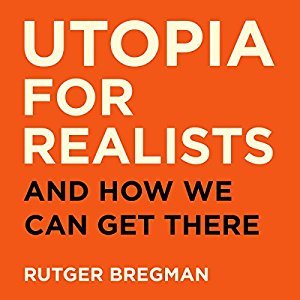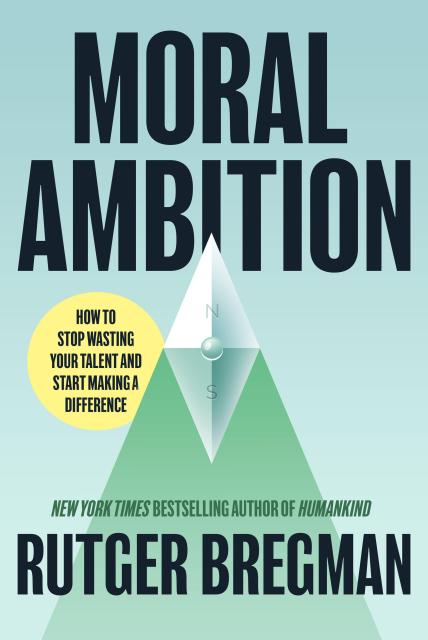Rutger Bregman

Utopia for Realists: How We Can Build the Ideal World
Rutger Bregman
Universal basic income. A 15-hour workweek. Open borders. Does it sound too good to be true? One of Europe's leading young thinkers shows how we can build an ideal world today.
After working all day at jobs we often dislike, we buy things we don't need. Rutger Bregman, a Dutch historian, reminds us it needn't be this way—and in some places it isn't. Rutger Bregman's TED Talk about universal basic income seemed impossibly radical when he delivered it in 2014. A quarter of a million views later, the subject of that video is being seriously considered by leading economists and government leaders the world over. It's just one of the many utopian ideas that Bregman proves is possible today.
Utopia for Realists is one of those rare books that takes you by surprise and challenges what you think can happen. From a Canadian city that once completely eradicated poverty, to Richard Nixon's near implementation of a basic income for millions of Americans, Bregman takes us on a journey through history, and beyond the traditional left-right divides, as he champions ideas whose time have come.
Every progressive milestone of civilization—from the end of slavery to the beginning of democracy—was once considered a utopian fantasy. Bregman's book, both challenging and bracing, demonstrates that new utopian ideas, like the elimination of poverty and the creation of the fifteen-hour workweek, can become a reality in our lifetime. Being unrealistic and unreasonable can in fact make the impossible inevitable, and it is the only way to build the ideal world.

Het water komt
Rutger Bregman
Als er nu één verhaal verteld moet worden, dan is dat het verhaal van Johan van Veen. Ingenieur. Vader van het Deltaplan. Een van de grootste Nederlanders aller tijden. Maar vrijwel niemand die hem kent.
Het verhaal van Johan is het verhaal van Nederland. Een verhaal dat sinds de Watersnoodramp van 1953 in de vergetelheid is geraakt, maar door de stijgende zeespiegel relevanter is dan ooit.
En dat laat zien: we kunnen de strijd tegen het water opnieuw winnen.

De meeste mensen deugen: Een nieuwe geschiedenis van de mens
Rutger Bregman
De mens is een beest, zeiden de koningen. Een zondaar, zeiden de priesters. Een egoïst, zeiden de boekhouders. Al eeuwen is de westerse cultuur doordrongen van het geloof in de verdorvenheid van de mens.
Maar wat als we het al die tijd mis hadden?
In dit boek verweeft Rutger Bregman de jongste inzichten uit de psychologie, de economie, de biologie en de archeologie. Hij neemt ons mee op een reis door de geschiedenis en geeft nieuwe antwoorden op oude vragen. Waarom veroverde juist onze soort de aarde? Hoe verklaren we onze grootste misdaden? En zijn we diep vanbinnen geneigd tot het goede of het kwade?
Adembenemend, weids en revolutionair – De meeste mensen deugen herschrijft niet alleen de geschiedenis, maar werpt ook nieuw licht op onze toekomst.

Im Grunde gut. Eine neue Geschichte der Menschheit
Rutger Bregman
Der Historiker und Journalist Rutger Bregman setzt sich in seinem neuen Buch mit dem Wesen des Menschen auseinander. Anders als in der westlichen Denktradition angenommen ist der Mensch seinen Thesen nach nicht böse, sondern im Gegenteil: von Grund auf gut. Und geht man von dieser Prämisse aus, ist es möglich, die Welt und den Menschen in ihr komplett neu und grundoptimistisch zu denken. In seinem mitreißend geschriebenen, überzeugenden Buch präsentiert Bregman Ideen für die Verbesserung der Welt. Sie sind innovativ und mutig und stimmen vor allem hoffnungsfroh.

Utopia for Realists: Why Making the World a Better Place Isn't a Fantasy and How We Can Do It
Rutger Bregman
We live in a time of unprecedented upheaval, when technology and so-called progress have made us richer but more uncertain than ever before. We have questions about the future, society, work, happiness, family and money, and yet no political party of the right or left is providing us with answers. So, too, does the time seem to be coming to an end when we looked to economists to help us define the qualities necessary to create a successful society.
We need a new movement. One defined by a young historian who can tell us the truth about how we got here. They'd be a political outsider, the voice of their generation, one who doesn't harness rage or agitate grievances but who provides us with the answers for which we've been looking. That person is Rutger Bregman, and his vision is Utopia for Realists.
Folk flest er gode: En ny fortelling om menneskenaturen
Rutger Bregman
Archived: Does not meet catalog guidelines

Utopia for Realists: And How We Can Get There
Rutger Bregman
We live in a time of unprecedented upheaval, with questions about the future, society, work, happiness, family and money, and yet no political party of the right or left is providing us with answers. Rutger Bregman, a bestselling Dutch historian, explains that it needn't be this way.
Bregman shows that we can construct a society with visionary ideas that are, in fact, wholly implementable. Every milestone of civilization – from the end of slavery to the beginning of democracy – was once considered a utopian fantasy. New utopian ideas such as universal basic income and a 15-hour work week can become reality in our lifetime.
This guide to a revolutionary yet achievable utopia is supported by multiple studies, lively anecdotes and numerous success stories. From a Canadian city that once completely eradicated poverty, to Richard Nixon's near implementation of a basic income for millions of Americans, Bregman takes us on a journey through history, beyond the traditional left-right divides, as he introduces ideas whose time has come.

Moral Ambition: Stop Wasting Your Talent and Start Making a Difference
Rutger Bregman
From the author of the New York Times bestsellers Humankind and Utopia for Realists—“a more politically radical Malcolm Gladwell” (The New York Times)—comes a bold manifesto daring us to harness our talents and transform our idealism into action, all with the goal of making the world a wildly better place.
A career consists of 2,000 workweeks, and how you spend that time is one of the most important decisions of your life. Still, millions of people are stuck in in mind-numbing, pointless, or just plain harmful jobs.
There’s an antidote to this waste of talent, and it’s called moral ambition. Moral ambition is the will to be among the best, but with different measures of success. Not a fancy title, fat salary, or corner office, but a career dedicated to the best solutions to the world’s biggest problems— whether that means tackling climate change, making pandemics history or fighting Big Tobacco.
In Moral Ambition, internationally bestselling author Rutger Bregman reveals how our conventional definitions of success are harming us and the planet, and shows how we can shift the focus from personal gain to societal benefit. In the process, he explains, we will join a growing movement of pioneers who are already living out this ethos. They’re the builders, the problem-solvers, the doers who have chosen a path less traveled. A guidebook to finding that path for ourselves, Moral Ambition reminds us that the real measure of success lies not in what we accumulate, but in what we contribute, and shows how we, too, can build a legacy that truly matters.

Humankind: A Hopeful History
Rutger Bregman
From the author of Utopia For Realists, a revolutionary argument that the innate goodness and cooperation of human beings has been the greatest factor in our success
If one basic principle has served as the bedrock of bestselling author Rutger Bregman's thinking, it is that every progressive idea -- whether it was the abolition of slavery, the advent of democracy, women's suffrage, or the ratification of marriage equality -- was once considered radical and dangerous by the mainstream opinion of its time. With Humankind, he brings that mentality to bear against one of our most entrenched ideas: namely, that human beings are by nature selfish and self-interested.
By providing a new historical perspective of the last 200,000 years of human history, Bregman sets out to prove that we are in fact evolutionarily wired for cooperation rather than competition, and that our instinct to trust each other has a firm evolutionary basis going back to the beginning of Homo sapiens. Bregman systematically debunks our understanding of the Milgram electrical-shock experiment, the Zimbardo prison experiment, and the Kitty Genovese "bystander effect."
In place of these, he offers little-known true stories: the tale of twin brothers on opposing sides of apartheid in South Africa who came together with Nelson Mandela to create peace; a group of six shipwrecked children who survived for a year and a half on a deserted island by working together; a study done after World War II that found that as few as 15% of American soldiers were actually capable of firing at the enemy.
The ultimate goal of Humankind is to demonstrate that while neither capitalism nor communism has on its own been proven to be a workable social system, there is a third option: giving "citizens and professionals the means (left) to make their own choices (right)." Reorienting our thinking toward positive and high expectations of our fellow man, Bregman argues, will reap lasting success. Bregman presents this idea with his signature wit and frankness, once again making history, social science and economic theory accessible and enjoyable for lay readers.